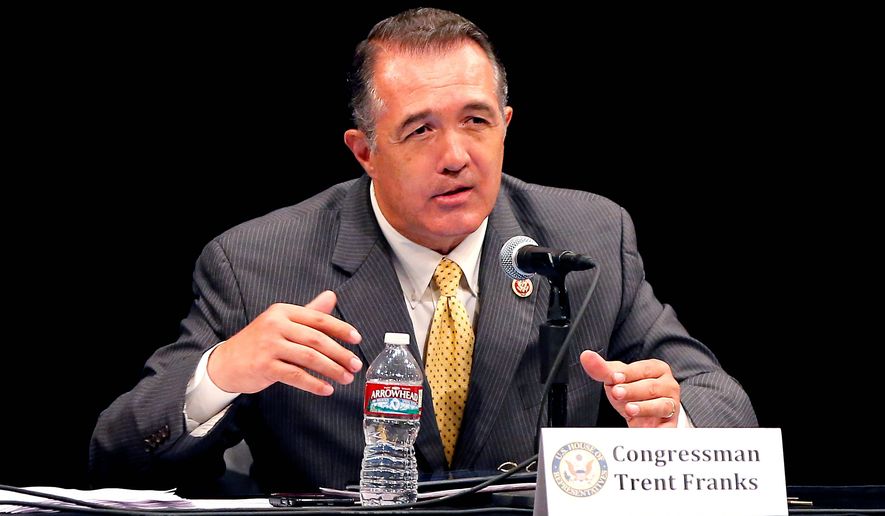Congress appears ready to give President Obama the $500 million he wants to arm and train moderate Syrian rebels, possibly as soon as next week, but anything beyond that remained murky, including whether lawmakers will back the commander in chief if he expands airstrikes to include targets in Syria.
“At this point in time, it’s important we give the president what he’s asking for,” said House Speaker John A. Boehner, Ohio Republican.
He and a number of fellow lawmakers said Mr. Obama’s speech to the nation a day earlier laid out a goal of destroying the Islamic State group but didn’t present a strategy.
Many Democrats are wary of renewed involvement in a Middle East conflict — particularly one Mr. Obama campaigned on ending. They questioned whether the president has authority to continue airstrikes beyond the 60-day window granted by the War Powers Resolution.
Enough lawmakers on both sides of the aisle appear ready to at least back the president’s call for money to arm Syrian rebels. They are hoping to put more pressure on militants from the Islamic State, which also goes by the acronyms ISIS and ISIL and which has been on the advance in Iraq and Syria this year.
“It’s up to Congress to rally behind President Obama and his decisive strategy,” said Senate Majority Leader Harry Reid, Nevada Democrat. “I’m confident we’ll put our political differences aside and work together to give this administration the tools it needs to meet ISIS head-on.”
SEE ALSO: Dick Cheney’s re-emergence complicates Obama’s response to Islamic State threat
This first decision for lawmakers is whether to approve the money as part of a $1 trillion stopgap spending bill Congress must pass by Sept. 30, or whether to hold a stand-alone vote.
That decision hadn’t been reached by the time lawmakers finished business Thursday and went home for a long weekend.
“If it were me, I would make it a separate vote because I think there’s some danger in mixing a lesser priority with greater ones — probably the greatest constitutional authority given to the Congress is the declaration of war,” said Rep. Trent Franks, Arizona Republican. “In a sense, this is at least related to that and so I don’t think it’s the best thing to mix the two.”
Beyond the funding, Republicans signaled that they eventually will insist on a broader debate over whether Mr. Obama’s tactics are enough to achieve his stated goals.
“I will support any measure that can ultimately defeat this threat which we see over there but is really a real threat to the United States and to the homeland,” said Rep. Michael T. McCaul, Texas Republican and chairman of the House Homeland Security Committee.
Both Republicans and Democrats say the administration needs to do more to ensure that foreigners fighting alongside the militants in Syria cannot return to conduct attacks at home.
Rep. Tulsi Gabbard, Hawaii Democrat, called on the president to suspend the visa waiver program that allows citizens from some countries to enter the U.S. without going through the scrutiny of obtaining travel visas.
Still other lawmakers are pushing legislation that would strip passports from American citizens who might travel to train and fight with militants, then come back to the U.S., where they could conduct attacks.
The administration provided separate classified briefings for senators and House members Thursday. Congressional leaders said briefings will continue next week, including public hearings with Secretary of State John F. Kerry and Defense Secretary Chuck Hagel.
Mr. Obama said he has to get permission from Congress to openly arm and train Syrian rebels. But he has said he doesn’t need Congress to approve his campaign of airstrikes in Iraq, which totaled 156 as of Thursday evening.
In his speech Wednesday, Mr. Obama also said he reserves the right to expand the strikes into Syria — though he said U.S. ground troops won’t be used for offensive combat operations.
The White House said Thursday that the president is acting under authority given to him by the 2001 Authorization for the Use of Military Force that Congress approved to go after al Qaeda and affiliated terrorists in the wake of the Sept. 11, 2001, attacks.
That claim is controversial on Capitol Hill.
Sen. Christopher Murphy, Connecticut Democrat, praised Mr. Obama’s plans but said Congress has a duty to vote on them. He said the 2001 authorization doesn’t cover this situation.
“If that were to be the case, there is absolutely no congressional check upon the executive’s power to open up military fronts against extremist groups anywhere in the world at any time,” he said.
House Minority Leader Nancy Pelosi, California Democrat, said Mr. Obama is on solid ground.
“What the president is doing now, I think he has the legal authority to do. I know he does. You know, I’ve studied this issue for a very long time,” she said.
• Stephen Dinan can be reached at sdinan@washingtontimes.com.
• David Sherfinski can be reached at dsherfinski@washingtontimes.com.




Please read our comment policy before commenting.